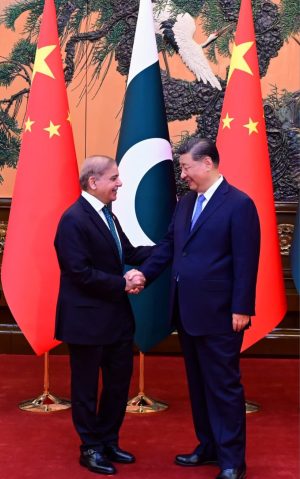During Prime Minister Shehbaz Sharif’s recent visit to China — his first since his victory in general elections in February — Pakistan and China announced plans to upgrade the China-Pakistan Economic Corridor (CPEC) and set in motion Phase II of this ambitious initiative.
A $62-billion project, CPEC connects Pakistan’s Gwadar Port with China’s Xinjiang region through roads and railway lines, in addition to developing power projects and special economic zones en route. Pakistan has long pitched CPEC as an initiative to revive its economy. However, CPEC has struggled to gain momentum.
Sharif’s visit to Beijing was aimed at assuring the Chinese government of Pakistan’s commitment to providing security for projects and thereby reviving the flagging initiative.
At a meeting between Sharif and Chinese President Xi Jinping, the two sides discussed aligning the Belt and Road Initiative (BRI) with Pakistan’s development plans, as well as expanding cooperation in areas like agriculture, mining, society, and livelihood issues.
The BRI is China’s ambitious plan to develop new trade routes linking China with the rest of the world. CPEC is considered the BRI’s flagship initiative.
The Chinese leadership’s announcement of support for Pakistan’s development is significant, particularly as the country faces a massive financial crisis.
During the meeting with Sharif, Xi emphasized the importance China places on its relationship with Pakistan. China views the China-Pakistan relationship from a “strategic and long-term perspective,” he said. At the same time, he highlighted the need for Pakistan to provide a “safe, stable and predictable business environment, and effectively guarantee the safety of Chinese personnel, projects and organizations” working in the country.
China’s concerns regarding the security of its nationals and the political stability in Pakistan have grown over the years, particularly after a suicide bomb attack in May 2024 killed five Chinese engineers working on a dam project in the country’s northwest.
Persisting political instability in Pakistan has also led to uncertainty for international investors and stakeholders, including China.
According to reports, Beijing recently requested Pakistan to launch a major military operation against militants targeting Chinese nationals in Pakistan, improve its currency reserves, and clear pending payments for its power producers operating in the country.
Amid these calls, Pakistan’s civilian and military leaderships are making joint efforts to address investor concerns over the country’s political stability and security environment. For instance, Army Chief Lt. General Asim Munir accompanied Sharif on his visit to Beijing. This was aimed at conveying a unified front to the Chinese leadership. Munir accompanied Sharif at key meetings with Chinese officials, including Xi and Premier Li Qiang to underscore Pakistan’s commitment to addressing Beijing’s concerns over political stability and security.
Despite the positive optics during Sharif’s visit, Islamabad has much work to do to win China’s confidence and secure tangible investments. This is especially true for CPEC-related investments and the resolution of the pending issues.
While dozens of memorandums of understanding were signed during the visit, there was no announcement of new Chinese investments or the rollover of pending payments, which Pakistan has been seeking.
This is important for Pakistan as it prepares to present its budget for the next financial year and continues negotiations with the International Monetary Fund (IMF) for a new loan agreement. The country needs to convince both the IMF and China to provide budgetary support in the form of new loans and the rollover of previous pending payments.
China may wait to decide on Pakistan’s budgetary requests until it completes its budget process and ongoing negotiations with the IMF.
Likewise, the IMF could be interested to see how Pakistan plans to address its concerns regarding budgetary gaps, especially regarding the future of debts Islamabad owes China.
The challenge for Pakistan is to address the concerns of its investors and partners regarding reforms, political stability, and security. As China and Pakistan move forward with the second phase of CPEC, addressing these concerns will be crucial to put ties back on track.
Sharif’s visit to Beijing was a step in this direction, but more needs to be done to restore Chinese confidence in Pakistan and to secure its support.

































